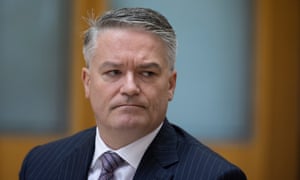Exclusive: Former finance minister’s pitch pushes ‘zero net emissions as soon as possible’, which contradicts record while in Australian government
Australia’s former finance minister Mathias Cormann is continuing to talk up the importance of a “collective green recovery” on the campaign trail to be the next secretary general of the Paris-based Organisation for Economic Co-operation and Development.
In a “vision statement” for the position obtained by Guardian Australia, Cormann says undertaking “effective global action on climate change is a must and we must get to zero net emissions as soon as possible”.
“Climate policy responses will increasingly need to factor into long-term planning,” Cormann says.
While arguing that different countries and regions across the world will have “different opportunities to make the strongest possible contribution to our collective emissions reduction outcomes”, Cormann says, through the OECD under his leadership, “we can come together to share ideas about our collective green recovery effort on our journey towards a low-emissions future”.
“As secretary general I will strive to make the OECD a place that inspires collaboration and action in support of a sustainable future”.
Cormann says the economic recovery efforts to Covid-19 are “a key opportunity to target support towards investments that drive the development and commercialisation of new technologies”.
The green recovery pitch is outlined in a vision statement document which has been sent by Australia to all ambassadors with a vote in the OECD selection process. Ambassadors have also been sent an official biography and a “letter of motivation” which cites Cormann’s experience as finance minister during the Covid-19 pandemic as evidence he can navigate complex economic challenges.
As well as the pandemic response, Cormann also highlights his experience as the government Senate leader to make a case that he can bring diverse groups together “across policy and ideological differences”.
The OECD has previously criticised Australia for its performance on climate change. Its membership is dominated by European countries and Australia’s climate change contribution has been queried by those with more ambitious emissions reduction commitments.
In an attempt to undercut Cormann’s current diplomatic offensive with European countries, the Australian Greens leader, Adam Bandt, has also written to the ambassador of every nation that has a vote in the OECD nomination process to warn that appointing him as secretary general would be “a blow to tackling climate change”.
Bandt points to Cormann’s vote to “repeal Australia’s successful carbon price” in 2014 and his attempts as a senior Abbott government minister to abolish the Clean Energy Finance Corporation and the Australian Renewable Energy Agency.
In 2011, Cormann characterised a carbon tax on Twitter as “not effective action on climate change” and “an act of economic self-harm which does nothing to help global emissions”. In 2016, he said Australia’s economy was “in better shape because we scrapped Labor’s carbon and mining taxes and implemented our plans for jobs and growth”.
Bandt has told ambassadors: “As finance minister, he tried to abolish the very same green finance bodies he will no doubt be promoting as evidence of his green credentials for the job.”
More recently, Bandt said Cormann has been a senior member of the Morrison government that has pushed for a “gas-led recovery”.
“Unfortunately, Mr Cormann’s record on climate change has been to block action at every turn during his years as a senior minister in the Australian government,” Bandt wrote.
Labor has supported Cormann’s nomination for the position, but on Wednesday the party’s Senate leader Penny Wong told the ABC if the former finance minister was ultimately knocked back by selectors, “I would venture this view, which is that the fact that Scott Morrison has been so isolated on climate, refused to be part of the solution, simply continues to be part of the problem – that would be a big reason why.”
The Morrison government has been pressed by some business groups, environmentalists and the Climate Change Authority to use the recovery from the coronavirus recession to direct economic stimulus towards the transition to a low-emissions future.
But while the prime minister is gradually warming up on the idea of achieving net zero emissions by 2050 – with a noticeable shift in rhetoric after Joe Biden won the American presidential contest – the Coalition has declared it will instead champion a “gas-led” recovery from the pandemic.
Cormann is using an RAAF aircraft to travel around Europe – at a rate likely to be about $4,300 an hour – and has been given a support team of about eight staff. The taxpayer-funded travel has created political controversy.
Cormann has already held meetings in Turkey, Denmark, Germany, Switzerland, Slovenia, Luxembourg, Belgium, Spain and Portugal, and has further visits planned to Austria, the Slovak Republic, Hungary and France.
Guardian Australia has been told Cormann also plans to travel to the South American countries of Chile and Colombia to press his case.
In his first public defence of the taxpayer-funded campaign on Wednesday, Scott Morrison said Cormann’s travel was “funded by the government because we’re taking this bid very seriously”.
“The reason we need him to do that in the air force jet is because Covid is running rampant in Europe,” the prime minister said during an interview with the Sydney radio station 2GB on Wednesday.
“I mean, there really wasn’t the practical option to use commercial flights in the time we had available, because of Covid. I mean, if Mathias was flying around on commercial planes, he would have got Covid. The risk of that was extremely high.”

No comments:
Post a Comment